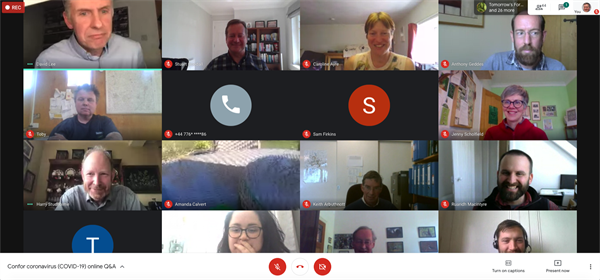Confor runs first Covid-19 webinar
The Covid-19 crisis has highlighted the vital role of the forestry and wood sector in supplying essential products - and although many member businesses are finding it tough, the long-term nature of the business means it is well-placed to participate in a “green recovery”

These and many other vital issues - especially around safe working - were discussed during Confor’s first-ever webinar on the industry’s response to the pandemic and its wide-ranging impacts.
Stuart Goodall, Confor CEO, said: “We know that businesses and individuals are hurting, and Confor will do whatever we can to assist them; we are talking to governments and enterprise agencies too about how they can support that.
“We want to encourage members to share specific details about the issues they are facing - but forestry and wood has an important role to play in responding to this crisis, and also in the recovery. There is already talk of a green recovery and the sector can be a big part of that.”
Caroline Ayre, Confor’s National Manager for England, said: “I’m an eternal optimist because we are a long-term business. What’s come out is a recognition that we supply essential products and people are understanding how important we are in the running of their daily lives.”
WATCH THE FULL WEBINAR HERE
Mr Goodall described how Confor had reacted to the unprecedented challenges posed by lockdown: "Our rapid assessment was that members needed access to information and guidance on what it meant for them, so we created our online hub as a single point to bring everything together, including links to general support for businesses in each country.We then got stuck into immediate challenges, most pressingly the issue of key or critical worker designation which was likely to prove vital if many businesses were to remain operational."
Mr Goodall: "We identified that pallets, biomass energy and food packaging would be designated critical products and contacted officials north and south of the border to explain why the supply chain that provided wood for these critical products also had to be designated; because the supply chain is interwoven, it wouldn’t be possible to simply identify a chain of businesses – instead any and all businesses partly active in supply would need to be included. This was ultimately successful."
Mr Goodall said Confor was monitoring those critical supply chains as part of its response to the crisis, and advising governments on their operation.
Providing support for businesses, including nurseries and tree planting, that weren’t identified as critical for safety and human health, was also vital - especially supporting them to continue working safely and responsibly, Mr Goodall added. Caroline Ayre said more than 80% of nursery workers had been furloughed initially, but seed sowing was continuing and "innovative approaches" were being developed to allow lining out to happen.
Stuart Goodall highlighted the creation of videos by people across the supply chain on why they were continuing to work in an industry that always emphasised safety and could practice social distancing on the majority of sites. He mentioned the partnership working between Confor and the Forestry Contracting Association, on the creation of a safe operating protocol for forestry, one of a suite that will be ready to deploy as more of the industry gets back to work.
Anthony Geddes, Confor's Wales Manager, said that this was symptomatic of a positive working relationship across the entire industry during the crisis.
Mr Geddes said that the differences in advice and guidance in different parts of the UK had at times caused confusion for businesses, but it was not yet clear what the impacts might be. He thought that the creation by Confor of guidance on key workers and letters of comfort for those continuing to work had been well-received and well-used by members.
The webinar was attended by people from across the entire supply chain, from landowners and tree planters through to sawmills and wood users, with a strong attendance by harvesting contractors. Caroline Ayre said she was concerned that some harvesting contractors were being squeezed by a lack of activity and urged the industry to support them in all ways possible.
In response to a question by Jim Burr, a contractor in Aberdeenshire, about a lack of work because of a reduction in activity at sawmills and other contracts, Mr Goodall said that mills had reacted to a lack of markets. However, there were positive signs as DIY stores like B&Q resumed operations , with some re-opening in construction and housebuilding too.
He sounded a cautionary note, saying that the Scottish Government had taken a stricter line in areas like construction, and Confor was working with the minister Fergus Ewing to help secure the sector as one of the first to return to work for more than critical products.
There were questions about timber prices and about whether the UK sector could lose out to cheaper imports if production stalled in certain areas. Mr Goodall said it was vital the UK was in a position to respond to market demand and didn’t lose out to imports. Strong market knowledge, as well as support from governments, was vital in terms of how the industry would fare during the recovery phase and what might happen to timber prices.
Caroline Ayre said there was a clear desire across the industry to keep working - and continued information and support for Confor members was vital as we started thinking about the recovery phase. The country supply chain groups established by Confor were crucial to gather information on the ground and feed back to governments. There was also regular liaison with other trade bodies like the Wood Panel Industries Federation, Timber Trade Federation and British Woodworking Federation, she added.
In response to a question on chainsaw use, she said that the industry was advising a "common-sense, case-by-case approach". She also highlighted challenges to forest owners who were losing income from areas like recreation due to the absence of travel.